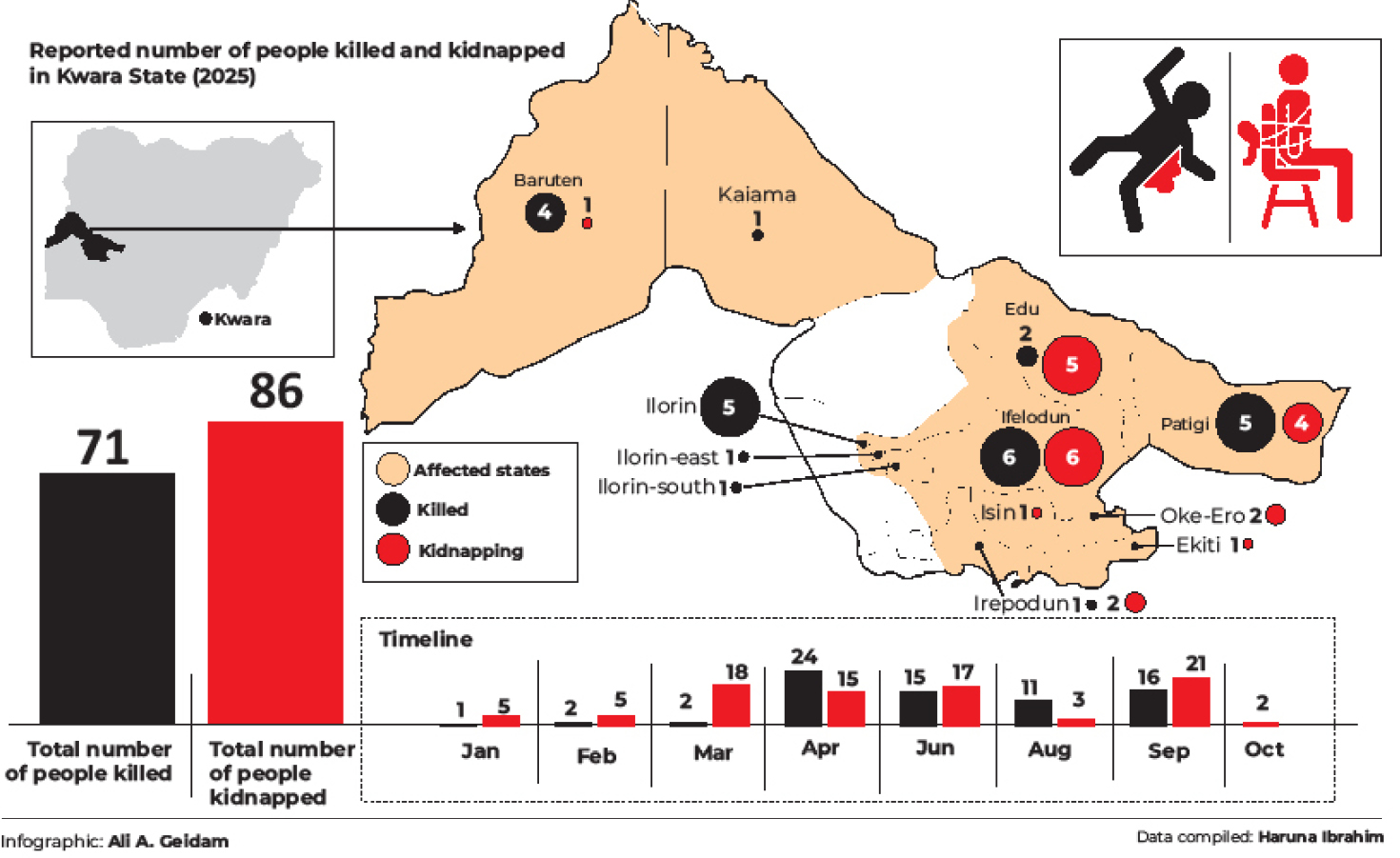News
Insecurity: Kwara Bleeds

Kwara, once regarded as one of Nigeria’s most peaceful states, has come under heavy attacks by bandits and other criminal elements.
In the last nine months, the state has witnessed an escalation of killings, abductions and mass displacement, a situation that has devastated many communities and families.
The latest major attack in Oke-Ode, Ifelodun Local Government Area, which left over 10 people dead, has spread fear and anxiety among residents, with many abandoning their farms, businesses and other means of livelihood to relocate to Ilọrin town and environs in search of safety.
The police confirmed 12 deaths, including hunters, newly recruited forest guards, vigilantes and civilians, with many others injured during the bloody incident.
Weekend Trust reports that economic activities have been grounded in the affected communities.
A viral video of a grieving woman sitting beside two male corpses – her husband and his friend – captured the emotional trauma surviving victims and relatives pass through on a daily basis.
“They have killed my husband, Ishola, and I cannot run from his corpse. I have no other person; I am the one videoing myself. He was coming home when they broke the glass of the vehicle he was in and killed him and his brother. They also killed 10 vigilantes and abducted a husband and wife,” the distraught woman said amidst tears.
The experience of Ishola’s widow has become a daily occurrence in many of the affected communities.
The gunmen brought international dimension to the issue with the kidnap of a Chinese mining investor in Oreke in June.
The police said that two of their officers, an Assistant Superintendent of Police and an Inspector, both attached to the 45 Police Mobile Force, Abuja, were killed in the incident. However, more than four months after the incident, the expatriate is yet to be found despite the fact that the abductors reportedly demanded a ransom of N1 billion.
At the last count, findings by Weekend Trust show that over 71 people have been killed, over 86 kidnapped and over 57 communities affected, many of them desolate. Several other attacks have gone unreported.

The spread
The situation in Kwara State has been attributed to several factors, including the inaction of past and present governments.
The latest spate of insecurity in the state began with the deadly activities of the Mahmuda group, a terrorist organisation that occupies the Kainji National Park, which stretches from Kwara to Niger State and beyond.
A top military officer involved in the ongoing onslaught against the bandits said the forest was bigger than two states.
According to locals, the group, which was initially welcomed as wandering preachers 14 years ago, snowballed into a merciless terror group. Initially carrying out sporadic disturbances, they later controlled parts of the park like warlords, burning farms, kidnapping villagers, killing vigilantes and displacing entire communities.
“There were just seven of them when they arrived – young married men claiming to preach and farm. Nobody suspected what they would become,” a community leader in Kaiama, one of the affected local governments recalled.
Weekend Trust reports that the evolution of the group from being preachers to militants was gradual but deliberate; and climaxed after they accused locals of betrayal.
According to community sources, Mahmuda began acquiring weapons, recruiting heavily and extorting villagers under the guise of communal protection.
While the group operated majorly around Kaiama and Baruten in the northern part of the state before the military was brought in to degrade them, some locals said they were also involved in the last attack at Babanla in Ifelodun Local Government Area on Friday, August 8, 2025 when over 200 armed bandits stormed the town.
The assailants, riding on motorcycles, attacked the divisional police headquarters, looted a market and set the police station ablaze. Five people were killed, including a police officer identified as Adejumo Wasiu.
As a result, over 3,000 residents from 15 communities, including Babanla, reportedly fled their homes, seeking safety in Ilọrin and neighbouring towns.
A resident of Babanla, Hamzat Waliya, who fled the community as a result of the incident, told Weekend Trust that she escaped miraculously.
“When they entered the community, I saw them and ran inside to pray. They went to my mother’s shop, looted the foodstuffs there and kidnapped two people.
“There were over 200 riding on motorcycles. This is our fourth month in Ilọrin,” the 19-years-old and mother of one said, calling on the government to come to their aid.
Mr Yusuf Jimoh, a community leader from Babanla, said the problem began about 19 years ago.
“Babanla used to be very peaceful and bustling in trade, but about 19 years ago, we started receiving strangers who were brought in with trucks from different tribes.
“Initially, they used to raid markets to loot foodstuffs before they graduated to kidnapping,” Jimoh said.
He listed the affected villages in Babanla, Ifelodun Local Government as Oreke 1; Oreke 11; Budo Idowu; Gahun and Olohuntele.
Others are Idinya; Ayeeke; Aifowomo; Ologoma; Ologorun; Shagbe; Famale and Bankole. He said there had been three incidents in Babanla that claimed many lives, adding that over 100 people have been killed since the attacks started.
“The first time they came, they killed 10 people. The second attack claimed over 20 lives, and the third involved about three casualties, including a commercial driver. Many of the affected villages have been deserted.
“To tell you their audacity, at times they feast with the animals they see around when they visit some of the deserted villages,” Yusuf, who said he accommodated 33 victims who fled Babanla in his Ilọrin residence, said.
According to him, since the last major incident where they killed six people, there is no day that people don’t get kidnapped. And many victims have died in captivity.

The fear of ‘Baba Sango forest’
For many residents of Ifelodun and other communities in the southern part of the state, the fear of Baba Sango forest, where the bandits terrorising Kwara State are hibernating, is the beginning of wisdom. Many of the victims have described the vast expanse of land as another government entity by the bandits.
“The forest, which begins from Oro Ago and is in front of Oro river, stretches to Patigi, Lafiagi and Egbe in Kogi State.
“They have turned the vast forest to a place of refuge after they launch any attack. You can trek 100 miles inside that forest and they are many.
“My brother, who recently gained freedom from the attackers, narrated that different sects of the bandits occupied three cells there. And one of the cells is more populated than the entire Babanla. Their wives and children strap AK-47 on their shoulders all the time and always at alert. That is the place from where all the bandits in Kwara now launch their attacks,” he revealed.
Tales from Kwara north
“One of the most deadly attacks on the residents of the zone occurred around June when gunmen in military uniform opened fire on a market in Ilesha Baruba, killing six people. The casualties include four civilian men, a vigilante and a teenager. Another vigilante was killed the same night in nearby Kaiama. Since then, over 15 vigilantes have been killed, with many others injured, kidnapped or held for ransom in suspected reprisal attacks over accusations of working with the government and the military,” locals told our correspondent.
In July, the security situation reached a worrying point following the exodus of residents from Lata Nna after heavily armed bandits stormed the communities, burning vehicles and engaging in gunfire with vigilantes. Residents fled en masse, taking refuge in neighbouring communities.
The incident followed a deadly encounter a few days earlier when the bandits dared security operatives in Gada Woro, along Patigi road, near Gbugbu, in a gun battle that left six people dead. The victims include four vigilantes and a police officer. Two soldiers, two police officers and six vigilantes also reportedly sustained gunshot wounds during the confrontation.
Weekend Trust gathered that the bandits, said to be in hundreds, challenged the joint security team to a gunfight inside the forest.
According to locals, the impact of the activities of the bandits has been catastrophic, with farming, which is the region’s lifeblood, worst hit.
A community leader who requested anonymity said, “They burnt our farms, killing about 200 livestock in the process. Forty farmers were kidnapped in one attack inside their farms and made to pay N10 million and 10 motorcycles valued at N1.3 million each as ransom. In another case, a victim was forced to work for the group in the forest for five months until a N10 million ransom was fully paid.
“They don’t spare anyone. An immigration officer who was kidnapped alongside a customs officer and some others died in captivity. They don’t like security personnel. They see them as a threat to their reign.”
However, following a recent military joint operation inside the Kainji National Park, where 12 bandits were arrested, residents said the attacks in places like Kaiama had reduced, but they still live in fear.
According to the latest information obtained from residents by Weekend Trust, attacks in Edu and Patigi local government areas in Kwara north have occurred in no fewer than 52 communities, resulting in the death of 23 persons and over 50 kidnapped.
It was gathered that in Lafiagi Emirate, the affected communities are Lafiagi Toen; Kpandaragi; Bokungi; Maganiko Ndanangi; Ndeji; Gamalegi; Haruna Kata; Gbale; Guye Dadi; Bishewa; Edogi Dukun; Ekko and Wariku.
Others are Motokun; Lata Nna; Lade; Lalagi; Sakpefu; Essanti; Lata Woro; Ndanakun; Mari; Lile; Dina; Gbogi; Kusoniguba; Kakafu; Gbangede; Ekati and Bologi, among others in Patigi Emirate.
Tsaragi Emirate has witnessed attacks in Tsaragi, Kusomunu, Ndafatako and Koko-Nna/Yanna, among other places.
In Kaiama Local Government Area, the affected places are Duruma, Kemanji, Nuku and Tenebo. There were some minor incidents at Nano.
For Baruten Local Government, residents listed Ilesha Baruba, Okuta, Boriya and Shiya town, Kosubisu and Gure as the most affected.

Kwara central not left out
Although the situation has drastically reduced in many parts of Kwara Central after several incidents in places like Oko-Olowo and parts of Asa Local Government Area, the district is not totally immune.
A former lawmaker, who once represented the council, Wahab Aliyu Opakunle, recently lamented that farmers and traders in his Afon constituency could no longer go about their businesses safely.
“After my trip to the United Kingdom, I wanted to be a farmer, but I cannot go home now. I am crying and bleeding within myself because of the security situation in Ila-Oja/Aboto/Odo-Ode ward. Our market has been paralysed; and farmers cannot go to farms,” he told Weekend Trust.
Factors fuelling security
Residents of the affected areas told our correspondent that the present spate of insecurity in Kwara State was fueled by many factors.
A resident and one of the youth leaders in Patigi who gave his name as Alhaji Mohammed and preferred to communicate through Whatsapp messages stated, “Several interlinked factors seem to be driving the insecurity in Edu and Patigi. It is a spillover from neighbouring regions.
“Kwara north shares borders with Niger and Kogi states. The ease of movement through under-controlled border zones allows bandits/criminal elements to enter, exit and smuggle weapons. And villages in Patigi have been voicing out over helicopter landings in their bushes.”
He stated that poverty, unemployment and economic marginalisation were also contributors. He also said that since people have limited access to jobs, markets and social services, they were more vulnerable to giving out information to bandits concerning their communities so that they would benefit from the payment of ransom, explaining that it is a new dimension to the problem.
“Land use, conflict over resources, and environmental stress like shrinking grazing lands are creating friction with farming communities like Lata-Nna in Patigi and other villages.
“The availability of small arms and light weapons, motorcycles and mobility in forested/rural areas give bandits the ability to strike and disappear. To worsen this, there are gaps in intelligence gathering and weak security presence. Remote areas are harder to reach and security forces sometimes respond late or lack local knowledge, coupled with insufficient community-security collaboration.
“There are opportunistic political manipulations. Our leaders threaten us whenever we talk about the menace,” he stated.
NYSC camp relocated; schools, markets shut
Penultimate week, the Kwara State Government approved the relocation of the 2025 Batch B, Stream II of the National Youth Service Corps (NYSC) orientation camp from its permanent site in Yikpata, Edu Local Government Area to the Kwara State Polytechnic, Ilọrin over insecurity.
Also, following a meeting by the chairmen of the seven affected local government areas – Ifelodun, Irepodun, Isin, Oke-Ero, Ekiti, Offa and Oyun in Kwara south – cattle markets were temporarily shut before a decision was taken to modify it following a meeting with traditional rulers to allow restricted hours of operation following a concern raised by Fulani groups.
The chairman of Ifelodun Local Government, Hadji Femi Yusuf, said the cattle market was fueling the situation as it had become an avenue for the bandits to gather information. But locals pushed back the narrative. While that was still on, the Kwara State Ministry of Health relocated its scheduled medical and surgical outreach programme for Ifelodun from Oke-Ode to Omupo Cottage Hospital. The Commissioner for Health, Dr Amina Ahmed El-Imam, said the decision was taken after reviewing the security situation in the area.

Counting the cost
The chairman of the Miyetti Allah Fulaku Yeso Yeso Development Association (MAFYDA), Alhaji Ali Mohammed Jonwuro, said that in the last two months, over 3,000 cattle were rustled in four local government areas – Edu, Patigi, Ifelodun and Irepodun, following various attacks on communities.
Jonwuro, who spoke with victims of cattle rustling and kidnapping on the sideline of an emergency meeting of the association in Ilorin, said N10 million was the least amount paid as ransom to secure the release of members of the association who were kidnapped.
He traced the insecurity ravaging the state to the inability of some community leaders to conduct a thorough background check on strangers coming to settle in their various communities.
Jonwuro said the attitude of singling out the Fulani tribe for vilification as perpetrators of criminal acts of kidnapping and banditry must cease, insisting that commission of crime transcends ethnic inclination.
He appealed to the state government through the Emir of Ilorin, Dr Ibrahim Sulu-Gambari, to prevail on communities that had shown hostilities toward their members fleeing from troubled settlements to accommodate them.
“More than 50 of our people have been kidnapped. The least ransom we have paid is N10 million; and some victims were not even released after that. We have lost more than 3,000 cows to rustlers. Other animals were also rustled. Many people don’t know that we (Fulani) are the most affected by the activities of these bandits. It is true that some people in our fold are criminals, but it is not a peculiar situation. We also have criminally minded people in other tribes.
“We have also had a situation where some monarchs in the southern part of the state accommodated strangers, especially those running away from Zamfara State,” he noted.
Muideen Hamidat, who has since relocated to Ilọrin with his family after the Babanla incident, told Weekend Trust that, “The killings going on there are too much and we want the government to do something. One of the most scary moments for me was when they came shooting sporadically while we were in the market. I had never experienced such situation in my entire life.”
Taibat Jimoh, a trader and indigene of Oreke, who is based in Babanla with her husband, said, “They kidnapped my sister’s son popularly known as Chairman. He was released after a N30 million ransom.
“As I speak, the Chinese miner who was kidnapped in Oreke is still in their custody several months now. I fled with my family without taking anything. They had to send my clothes to me. We were 15 that came to this location.”
For Mrs Sikirat Yunus: “It had been a harrowing experience for us before we decided to relocate from Babanla.
“I relocated to Ilọrin with 15 other victims. In Babanla, we didn’t know whether we would see the next day. Sometimes we could not even go out of our homes or go to farm. We couldn’t sleep. We abandoned our cashew and maize farms.”

Call for IDP camp
The secretary of the MAFYDA, Muhammad Abdullahi Lamido, pleaded with the state government to establish internally displaced persons (IDP) camps for people who have been rendered homeless as a result of banditry.
Ajayi Okasanmi, a top security expert and one of the longest serving police public relations officers in Nigeria before he retired, said the security situation in Kwara worsened due to complacency, community connivance, lack of manpower, politicisation and porous border communities.
“Kwara, which is known as a State of Harmony, has been bedeviled by insecurity and people just assume that everything is okay without doing the needful. Also, the fact that Kwara has boundaries with some of the northern states that are well infested with banditry is another major reason. Then, there is connivance between some members of the communities where this is happening with criminal elements.
“Another major factor is lack of adequate facilities. The police and military are not well equipped and funded. For example, in Kwara State, at the time I was still in service, we had less than 4,000 officers to police about 5 million citizens. This is a far cry to the United Nations’ standard of policing. There is also political influence; you can see the signal in Kastina State.
“The bandits they say they are having peace deal with were brought out from the bush in the open, where everybody saw them. They say they are talking about peace with people that have killed a lot of people and you think that will not be enough to encourage others to go into the bushes to begin to do all those nonsense because at the end of the day, they will still come and beg them to drop their sword.
“I am yet to see one place that the so-called peace deal with bandits has worked. And when they were coming for all those peace meetings, they were allowed to come with all their arms and equipment in the open. This is a wrong message that is being passed. Then you have the dimension of natural resources. Sometimes bandits don’t kidnap for money but to draw attention. Investigation is still ongoing on the kidnapped Chinese” Okasanmi said.
He decried the fire brigade attitude of the government on the issue, saying, “Instead of being proactive, we are always reactive. And the moment the noise subsides, you see that everything will relapse to their usual level and all the police and military deployment will be withdrawn. I don’t blame them because there is lack of funding and manpower.
He also said Nigerians should desist from ethicising the situation. “As a policeman, I had arrested people that would be speaking colloquial English to send a certain impression, but when you unveil them, you would discover that they are not the people we think they are. So, a criminal is a criminal, it doesn’t matter his tribe, religious or ethnicity,” he added.
On his part, a retired director of the State Security Service (SSS), Dr Suleiman Bolakale Abdulsalam, said there’s the need for the government to go back to the drawing board and become proactive.
“One million operational vehicles and weapons cannot solve the problem, except you motivate contacts, informants and sources at the grassroots, like the vigilantes and members of the National Union of Road Transport Workers (NURTW) and the Road Transport Employers of Nigeria (RTEAN) who have security backgrounds, for their commercial drivers to tape information from passengers, including meeting with traditional rulers.
“Although investigation is still ongoing, the Babanla episode has been found to be aided and abetted by some traditional institutions in various communities.
“What role is the National Orientation Agency (NOA) playing to sensitise the people? What role is the Nigeria Immigration Service playing to identify aliens in various communities? The moment they are not posted to passport office, borderline and seaports, they are not proactive. They don’t report for work at the local government level except when elections are close,” he said, adding that the police lack enough equipment and logistics to tackle the problem.

Kwara mulls local security, as police step up efforts
The police command in Kwara State has assured the people that its men are working tirelessly to return peace to the state, lamenting that the payment of ransom is fueling the situation.
“Activities of bandits are now being checked. They used to move freely and attack communities at will, but with intensified security operations, their reach has been curtailed.
“Many displaced residents are gradually returning to their homes. Although the threat is not completely gone, there is a strong assurance that the fight will be won.
“Governor AbdulRahman AbdulRazaq deserves credit for acting swiftly. He promptly reached out to the National Security Adviser, Mallam Nuhu Ribadu, whose intervention brought 16 armoured personnel carriers, more troops and reinforcements to support the police. That single step changed the balance on the ground,” the commissioner of police, Ojo Adekimi said.
On how Kwara drew the attention of these bandits, the CP noted that many of them were already hiding in the state’s forests. “When pressure mounted in Zamfara, their colleagues encouraged them to move here, describing Kwara as profitable. The communal culture of our people made ransom payment easier- families and neighbours always contribute to free even the poorest victims. That system created a steady attraction for the kidnappers,” he said.
Meanwhile, Governor AbdulRazaq has vowed that nowhere will be safe for bandits in the state, even as the government mulls setting up of a civilian task force.
“I had a robust engagement with my compatriots from Edu and Patigi local government areas. It was an emergency meeting to review the security situation there and share ideas on how to better curtail the very disturbing incidents of kidnapping and violent attacks on innocent people.
“We are exploring having our own civilian task force, which members will be recruited from our local communities, trained, supported and allied with the security forces to strengthen our defence mechanisms in the face of the unique threats we face,” he said.
He added that victims of these incidents would be supported, and said, “This meeting occurred a few hours after I returned from a visit to Oke Ode, Ifelodun Local Government Area following the sad incident.”
He said he swiftly briefed President Bola Tinubu about the situation and he reiterated his request for additional federal deployment to raid the hideouts.
“The army headquarters has since relocated the General Officer Commanding (GOC) of the 2nd Division to Ilorin as part of the renewed efforts to strengthen security operations in the state.
“On Monday night, combined forces of the Army, SSS and Police launched an offensive around Baba Sango, along the Kwara, Kogi border, neutralising 15 armed bandits. The same operation continued on Tuesday and yesterday night.
“Although it has been quite challenging, everything is being done to mitigate its effects and end it. Our administration will fight insecurity with every resource at our disposal,” he noted in a statement by Rafiu Ajakaye, his chief press secretary.
However, Yunus Jimoh, a community leader in Babanla said, “All the bandits terrifying Kwara State are hiding inside that forest. It is until the government bursts the forest in a coordinated approach that we will be able to have peace. The soldiers are not going inside the forest; they only guard the town where majority of us earn our living.” (Daily trust)
-

 Politics19 hours ago
Politics19 hours agoOsun gov’ship: My disqualification a huge joke – Omisore
-

 Opinion19 hours ago
Opinion19 hours agoInsecurity and plenty conspiracy theories
-

 Business19 hours ago
Business19 hours agoCAC To Ban Unregistered PoS Operators From Jan 1
-

 Politics19 hours ago
Politics19 hours agoHow APC, ADC Benefit From PDP Crisis
-

 News19 hours ago
News19 hours agoBrazilian Ship Intercepted with 25.5kg Cocaine at Lagos Port
-

 News19 hours ago
News19 hours agoAkpabio Denies Filing Fresh N200bn Suit Against Sen Natasha
-

 News18 hours ago
News18 hours agoFive ambassadorial nominees haunted by controversies
-

 Opinion19 hours ago
Opinion19 hours agoInsecurity: Other Wars General Musa Will Face


















